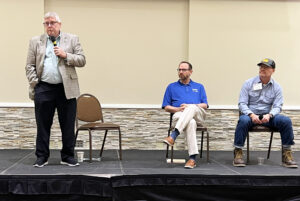Taking workplace mental health from awareness to action
By TIM ROWDEN
Editor-in-Chief

Sunset Hills, MO – James Pursell has been a concrete laborer with Laborers Local 110 for 24 years. He’s also a Marine combat veteran, son, husband, father and someone in sustained substance use – alcohol use – recovery and mental health recovery.
“I’m really proud to talk about mental health recovery and what that means,” Pursell said. “Getting help works. Going to treatment works.”
Pursell, who along with Aaron Walsh, of Laborers Local 42, heads up the Laborers’ LEAN-STL (Laborers Escaping Addiction Now) peer support program, was part of a recent panel “Mental Health in the Trades: From Awareness to Action,” the first in a three-part series presented by Aetna, Construction Forum, and the AFL-CIO Missouri Works Initiative May 15 at Laborers Local 110’s LiUNA Event Center in Sunset Hills, Mo.
“Not everybody is going to have a diagnosis,” Pursell said. “This is incredible that we’re having these conversations. We’re breaking down the stigma, being open about our struggle. Guess what, the secret is out, we all struggle. We’re human beings, we all struggle.
“Men and women in construction are no different than any other men and women in any other occupation,” he said. “We work together. We know each other. We work in teams together. We strive together. We know when someone is struggling. We know when good things are happening, when we’re having marriage, children. So we know when people are struggling. And I think it’s a powerful part of who we are, what it means to be a human being that we can support each other.”
Pursell and Walsh man a 24-hour hotline where Laborers who are struggling can reach out for support, including guidance on getting into treatment and recovery.
The LEAN-STL program offers a variety of tools and contacts for Alcoholics Anonymous, Narcotics Anonymous, the 988 Suicide & Crisis Lifeline, National Alliance on Mental Health (NAMI), the Veterans’ Crisis Line and the Laborers’ Addiction program.
Members can reach out for support for themselves or their families by calling the LEAN-STL hotline at 844-691-LEAN (5326) or visit http://www.stllaborers.com/lean-stl. The hotline is 100 percent confidential and available 24 hours a day.
FROM AWARENESS TO ACTION
Awareness of workplace health and mental health issues has grown in recent years, said Dr. John Gaal, director of the Missouri Works Initiative’s worker wellness program. Gaal was director of workforce readiness and training for the Carpenters union for 30 years and worked with Washington University researchers at the time around work-related health and safety.
“This journey started for me 20 years ago,” Gaal said. “Safety was about the physical, it wasn’t about the mental.”
Over time, as Gaal has continued to work with researchers at Washington University, things have evolved to what is now known as total worker wellness, which recognizes the critical role of mental health as well as physical health.
ADDRESSING THE STIGMA
The Centers for Disease Control and Prevention have identified the construction industry as No. 1 when it comes to opioid misuse and No. 2 when it comes to suicide among other industries.
Those realities hit home for Gaal in 2016 and 2017.
In 2016, Don Willey, then business manager of Laborers Local 110, lost his son to an opioid overdose.
“That’s when it hit me to the depths of what stigma was when it came to opioid use disorder. We were at a function and I told him, ‘Don, there’s not much we can do to change the past but I’ll help you do whatever we can to change the future.’”
Then, in 2017, Gaal lost his son to suicide, and Willey was there for him. The two teamed up to begin addressing opioid abuse, mental health and suicide prevention in the construction trades.
“We got a lot of push back from Labor and management,” Gaal said. “It wasn’t a white collar issue; it wasn’t a blue collar issue. People were telling us they’d already talked to their legal people and they said stay out of it. We pushed ahead. And then we realized what the statistics were telling us from the CDC. That he had a personal connection to the opioid issue in this industry, and I had a personal connection to the suicide issue in this industry. And when we made those connections with the crowd, we started to turn people’s minds.”
FROM AWARENESS TO ACTION
Gaal cited the Laborer’s LEAN program, the work of United Way, Holland Construction, S.M. Wilson, and others in helping to address total worker health.
“People have really begun to move in a good direction on this. We’ve raised awareness; it’s time for action,” Gaal said.
Dr. Andrew Loiterstein, director of programs for the National Alliance on Mental Illness (NAMI), said one in five persons have a mental health issue. Of those, he said, only about 40 percent will seek treatment.
“The big fight is over de-stigmatization of mental illness. Because the stigma of mental illness is what prevents so many people from getting help that would enrich their lives and the lives of those around them in so many ways,” he said.
GOOD FOR BUSINESS
Seeking treatment for mental health struggles and substance abuse and creating a culture that supports and assists those seeking treatment is not only good for individuals, their families and communities, Loiterstein said, it’s good for the bottom line.
To support his claim, Loiterstein offered the following statistics:
- Only 57 percent of mental illness is treated.
- 35 million workdays a year are lost to mental illness.
- Untreated mental illness costs United States companies $105 billion a year.
- One in 10 full-time employees have an addiction.
- Employees with ADHD (Attention Deficit Hyperactivity Disorder) are 18 times more likely to experience difficulties in their work.
“The most forward thinking business owners, managers and executives are understanding that supporting mental health is not only good for the employees; it’s good for the bottom line as well,” Loiterstein said. “All of the support that we can provide for our employees actually increases productivity.
“When we support the mental health needs of our employees, of our workforce, of our communities, we have a reduction in sick days. There’s improved productivity, there’s engagement, there’s loyalty to our companies. Because when our companies support us and support our needs, we support them right back. There are reduced health care costs, and we have increased safety and fewer accidents.”
REGISTER FOR FUTURE SEMINARS
The seminar was the first in a three-part series, providing a 30,000-foot view of the mental health issue, Gaal said.
The second seminar in the series, “Mental Health in Construction: Suicide Prevention,” will be held July 31 at the LiUNA event center.
The final seminar, “Substance Use Disorder,” will be held Sept. 17 at the same location.
Registration is free, but you must register to attend. To register, visit https://search.app/daGNstBmws6nHKjcA.
RESOURCES
For other resources, visit:
- NAMI-STL – Support Groups at https://www.namistl.org/support-and-education/support-groups; or Resources at https://www.namistl.org/resources.
- LEAN-STL at https://www.stllaborers.com/lean-stl.
- St. Louis Community College – Community Health Worker program at https://catalog.stlcc.edu/programs/accelerated-job-training/community-health-worker/index.html.
- Safer Homes Project – MIMH (Missouri Institute of Mental Health at UMSL) https://mimhtraining.com/event/conversations-for-suicide-safer-homes-a-calm-informed-training.
- Missouri Works Initiative – Weekly Worker Wellness Blog at https://moworksinitiative.org/category/worker-wellness-news.




Leave a Reply